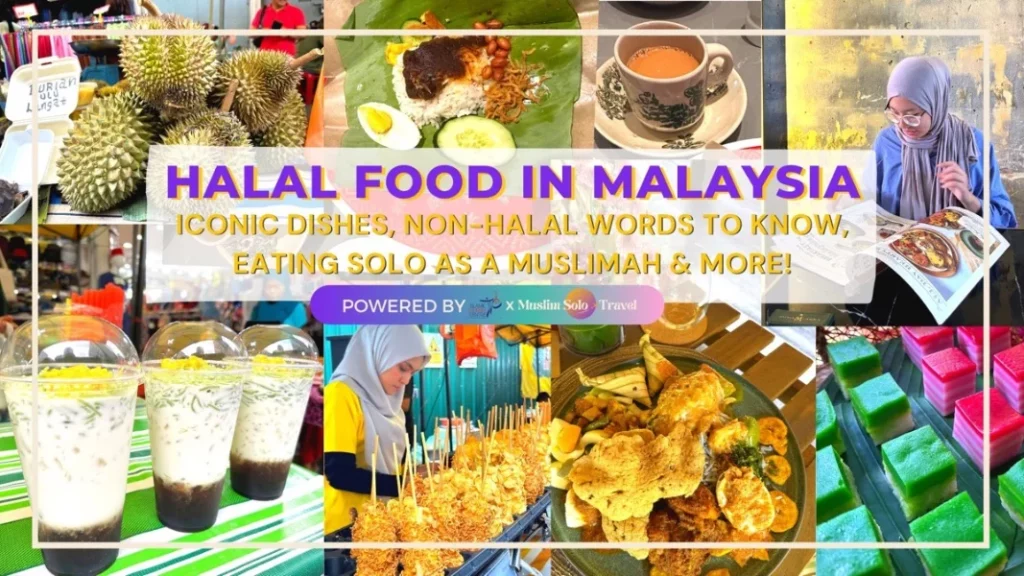
Are you a Muslimah Solo Traveler who can’t decide on what and where to eat when in Malaysia?
We feel you.
The country’s the epitome of Halal. And with a deeply rooted foodie culture, you might not even know where to start when searching and exploring the Halal Food in Malaysia.
But don’t worry; we’ll assure you that by the end of this article, you’ll get an idea of what to eat, when to have it, and what’s more, enjoy Muslim-friendly Malaysia to the fullest!
Let’s get started, shall we?
- Halal Certification in Malaysia (& Non-halal Words & Label To Watch Out For)
- Must-try Malaysian Iconic dishes
- Foodie Culture in Malaysia
- Dining Alone in Malaysia as a Muslimah
- When in Malaysia – Must-try Tropical fruits
- Halal Convenient Stores & Deliveries – Perfect for Muslimah Solo Travelers on the go!
- International Halal Gastronomy
Halal Certification in Malaysia (& Non-halal Words & Label To Watch Out For)
Did you know, that Malaysia’s Halal Certification, JAKIM is the World’s First Halal Certification Body?
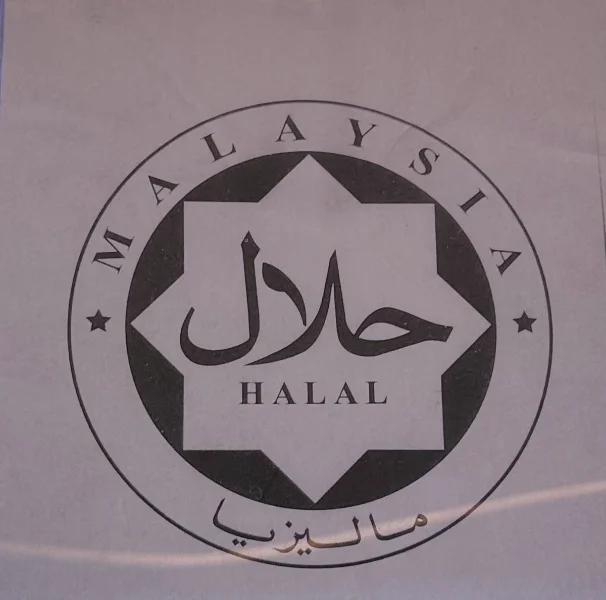
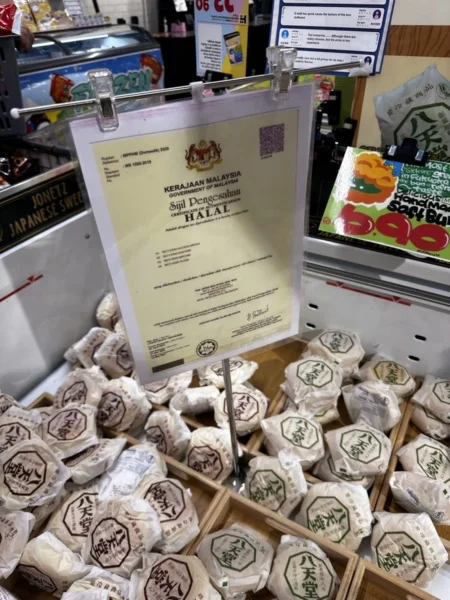
As a globally recognized certificate that sets the world’s standards when it comes to Halal in the country, the body monitors the Malaysian Halal Food Regulation and has become a logo that’s not only recognized throughout the country but globally.
So if you’re thinking, “What is halal in Malaysia?” or are wondering, “What food products are halal in Malaysia?”, the JAKIM logo would be a comforting and reassuring symbol before proceeding to eat.
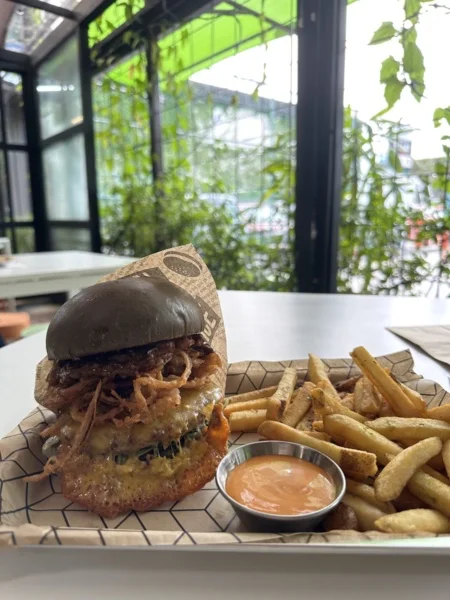
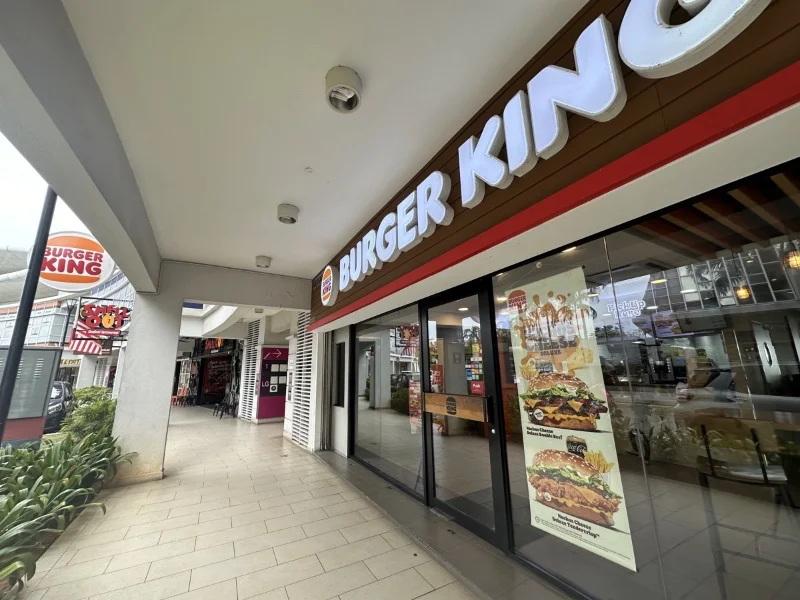
You can even find this Halal-certified logo in fast food establishments like McDonalds, Burger King, etc. – Fast food that is typically not Halal in Muslim-minority countries.
However, as a predominantly Muslim country, it is easy to assume that “everything is Halal in Malaysia.” If you’re not aware, this ignorance can provide a surprise once you find out that Malaysia is also a multicultural country that has diverse food offerings.
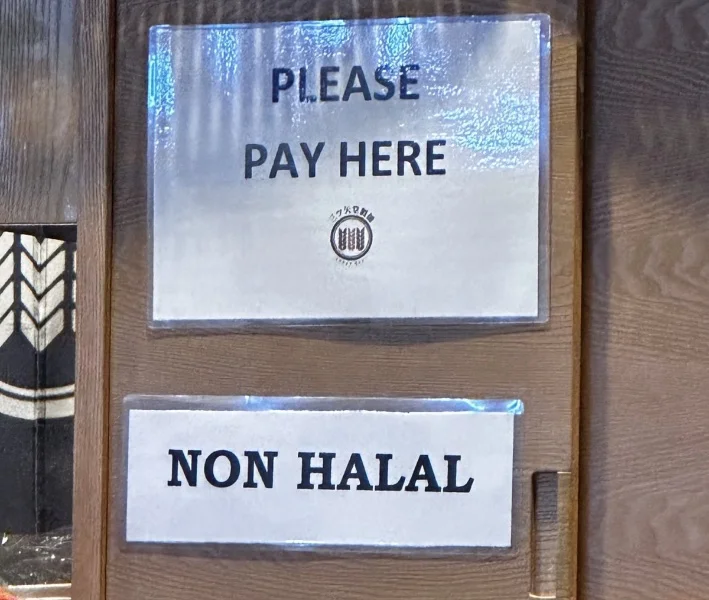
Besides the usual ham, beer, and bacon, some inconspicuous Non-halal words to know are:
- Babi: pork
- Tuak: Rice wine that is offered by the indigenous people, usually residing in the interiors
- Arak: Wine in the Malay language
- Bak Kut Teh: Meat bone dish that consists of pork
- Charsiew / Charsiu: Chinese BBQ Pork
Does Malaysia serve halal food?
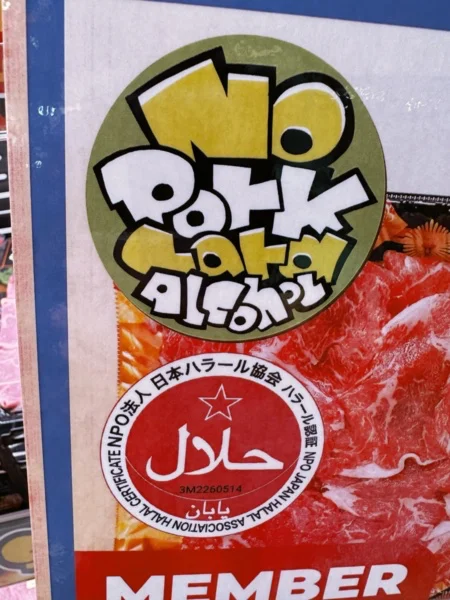
Some establishments are known to be Halal just by the place’s decoration. You can see it prominently with frames of Quran verses. But if you’re unsure, ask, and the locals would happily be straightforward. They’ll happily let you know if something is not halal, too.
While it is easy to know if a product is halal by checking its label, it can also be tricky in some situations.
Be careful with the word bacon, as some fast food has incorporated the word “beef bacon” to signify that beef is made into thin strips and is Halal to be eaten.

Pork-free is also used in certain establishments that are not yet certified by JAKIM so there’s still ambiguity and no guarantee if cross-contamination occurs there.
At the end of the day, double-check if you’re unsure.
How do you check if a product/premise is halal or not?
The halal logo is a widespread logo found in almost every product and establishment. Even supermarkets and street vendors would designate themselves as “halal” or “non-halal” for the convenience of your dining habits.
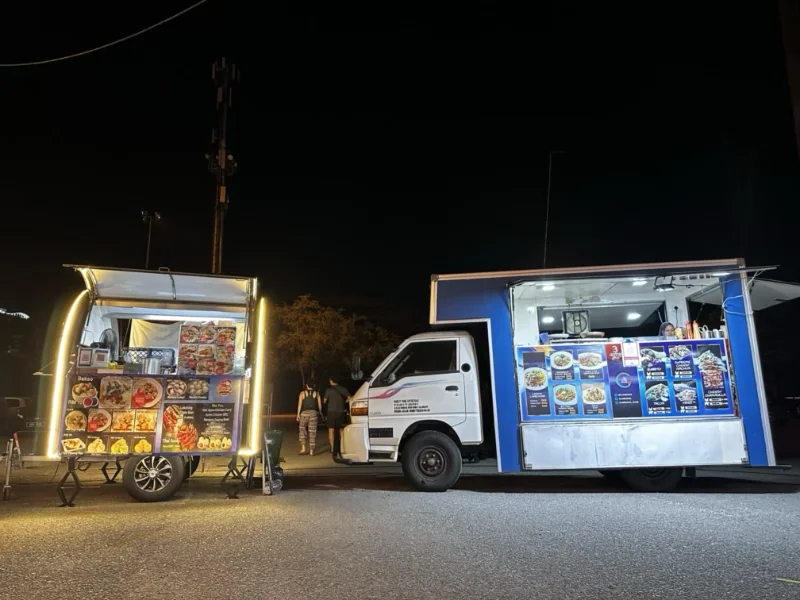
But if you need to check, there is a Halal Malaysia directory managed by the country’s governing Halal Jakim Malaysia body, so you can check the Halal status of all kinds of products and premises in the country.
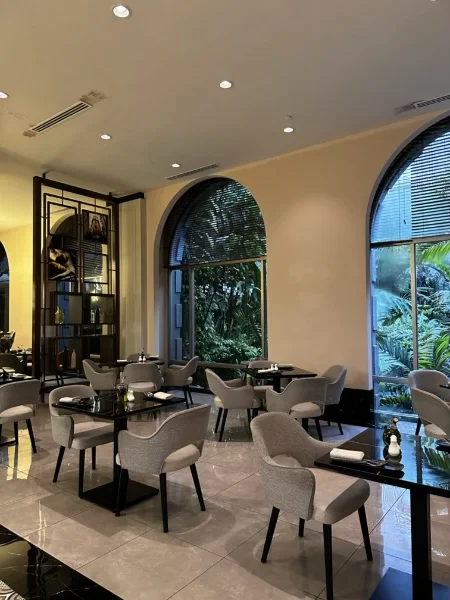
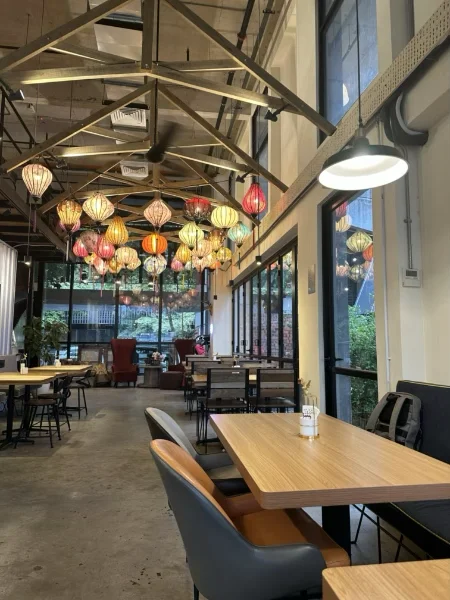
Must-try Malaysian Iconic dishes
A couple of Must-try Malaysian Iconic dishes or food should be on your #MuslimFriendlyMalaysia list in the country. Depending on where you go, these iconic dishes are readily available throughout food courts, restaurants, and many eateries.
Nasi Lemak
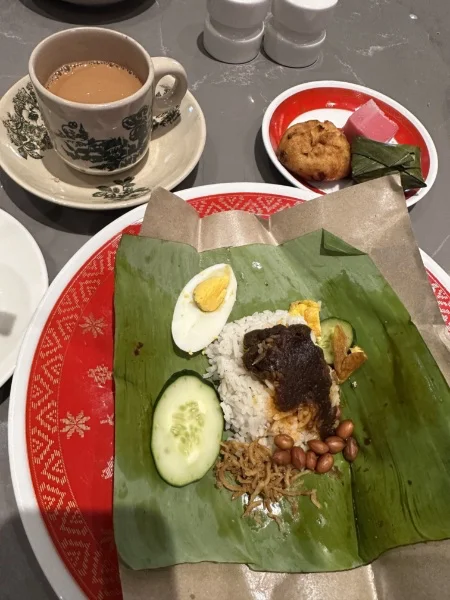
The humble fragrant rice dish cooked in coconut milk, paired with anchovies, cucumber, hard-boiled egg, toasted peanuts, and sambal condiment, is known as the national dish of Malaysia. This came from a humble origin as a Malay Farmer’s Meal that can help them sustain throughout the day at the farm such as a Paddy field, or Oil Palm Estate.
These days, Nasi Lemak comes in various extra sides like Rendang, fried chicken, and much more.
Ais Kacang
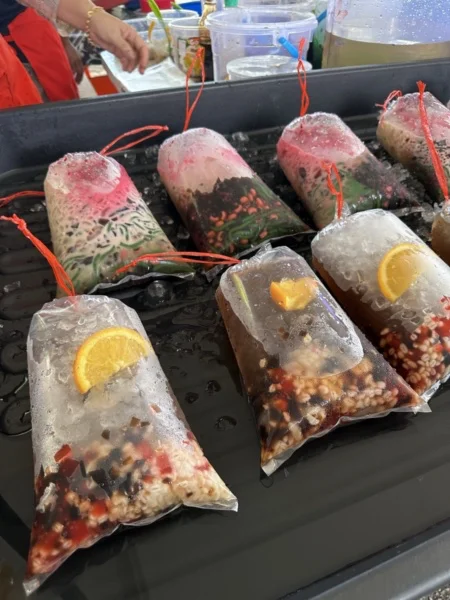
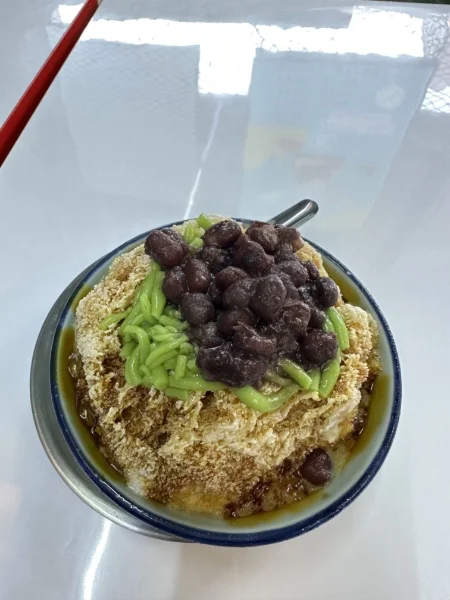
As a country that experiences summer all year round, this shaved iced sweet dessert will be able to drench the heat away with just a bowl of its goodness. Ais Kacang is drizzled with palm sugar syrup, red beans, jelly cubes, sweet corn, and evaporated milk. The Cendol version comes with green rice flour-based droplets.
Laksa
If the Italians have spaghetti, the Malaysians have Laksa.
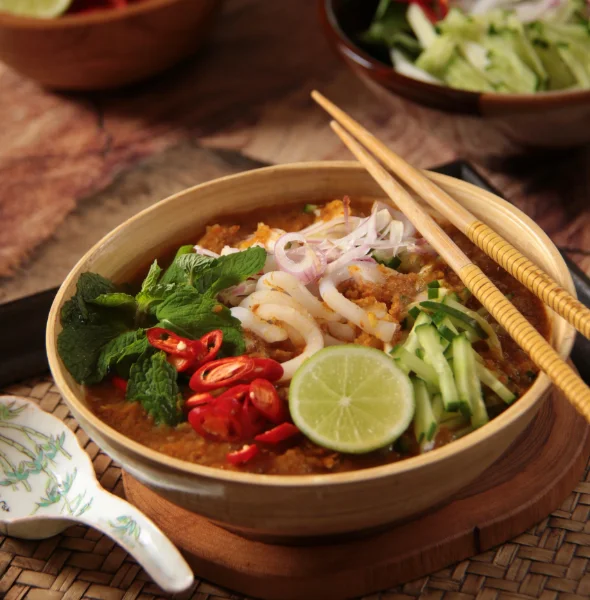
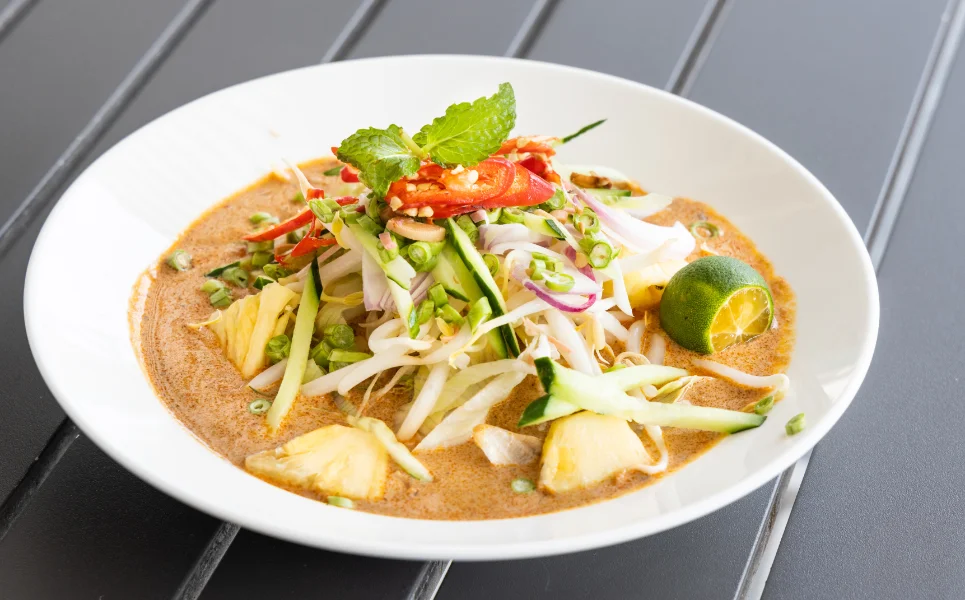
Depending on the state you visit, the laksa is never the same, as each state has a specialty Laksa. Laksa is typically a spicy noodle dish that is served with rice-based noodles. Most of the variation comes in coconut broth that is seasoned with a variety of ingredients. Sarawak has Laksa Sarawak, Penang has Assam Laksa; Johor has Laksa Johor, and etc.
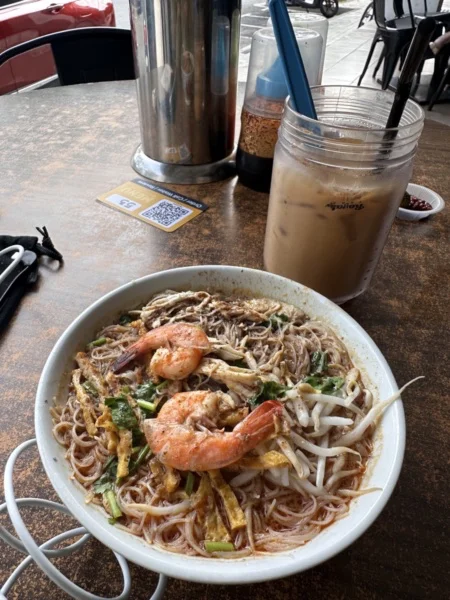
Satay – Beef or Chicken
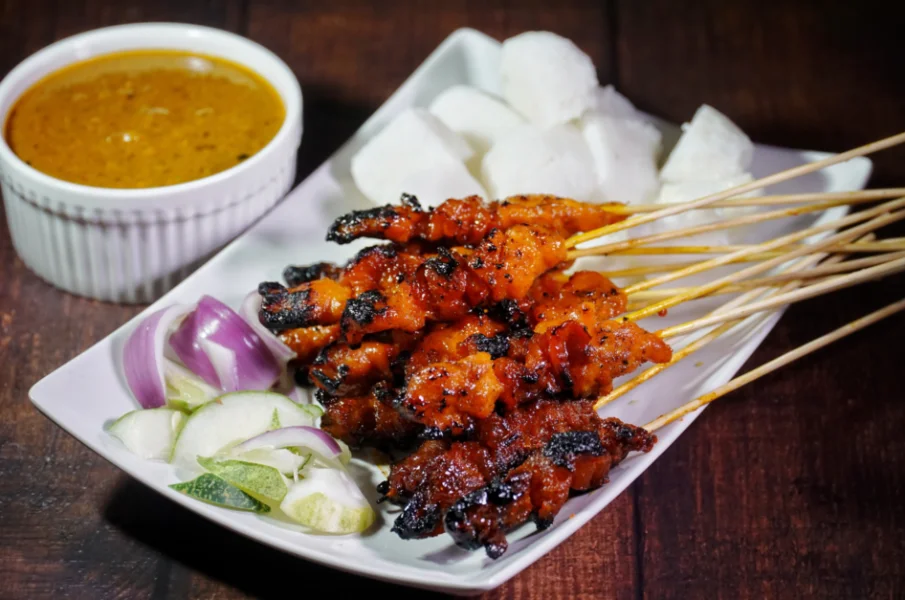
Walk past night markets in Malaysia, and you’ll see folks fanning skewered, minor cuts of meat marinated with various sauces on sharp, wooden sticks. These are called satay. They come in several types of meat – typically beef, chicken, mutton, or lamb (aka the most expensive one).
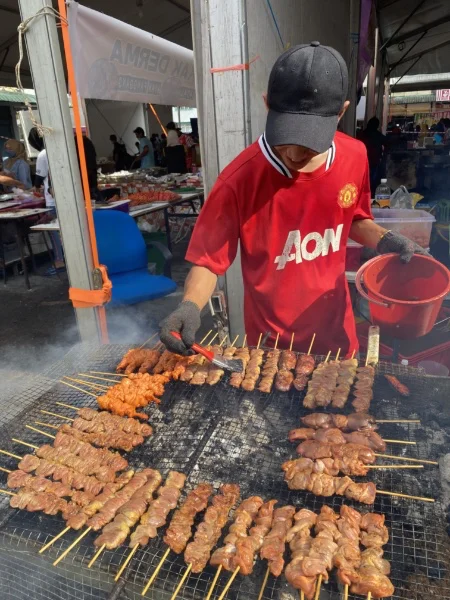
But be careful, as in non-Muslim hawker stalls, you’re bound to meet non-halal satay, too.
Roti John
A type of omelet sandwich that is believed to originate from Singapore, but is a famous Malaysian street food that is widely available during Ramadhan month.
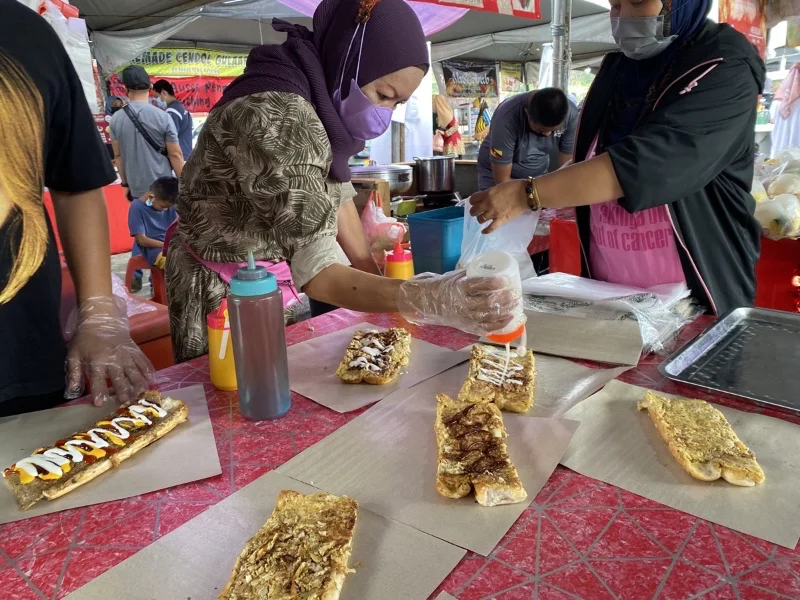
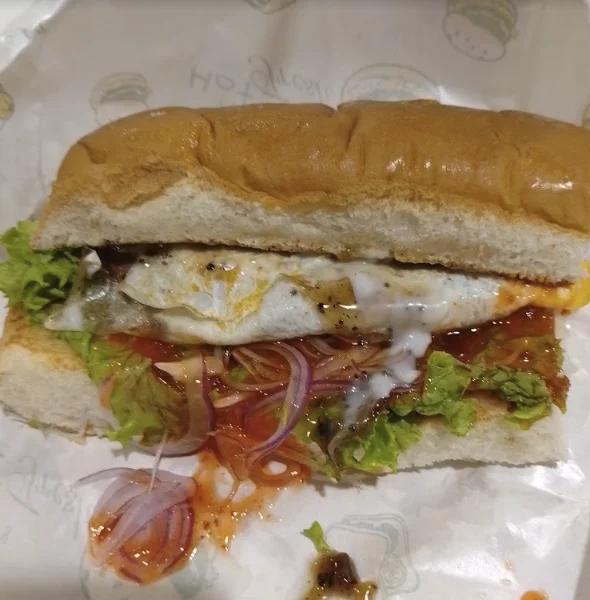
Nasi Kandar
This popular Northern Malaysian food from Penang is a culture brought in by the Indian immigrants, who have now assimilated into the local culture as Mamak folks (ethnic Indian Muslims). This is basically steamed rice, served with curries of your choice – fish head, mutton, or lamb – and then together with side dishes of okra, prawn, squid, or egg.
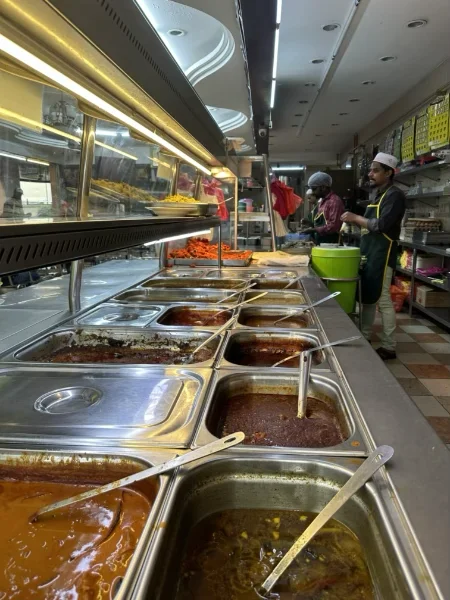
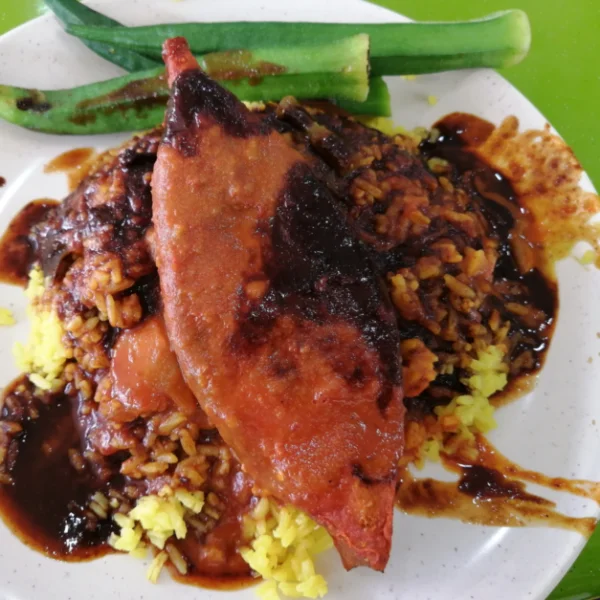
The way to eat this? With your bare hands, so you can smell the Nasi Kandar aftertaste!
Roti Canai
Recently ranked the world’s best bread by Taste Atlas, roti canai is a pan-fried flatbread tossed in the air and folded repeatedly by hands. Whether you eat it in a Mamak restaurant or a Malay local hawker shop, the taste of the roti canai is never the same. Typically, it is eaten with curry, dhal curry, or sambal!
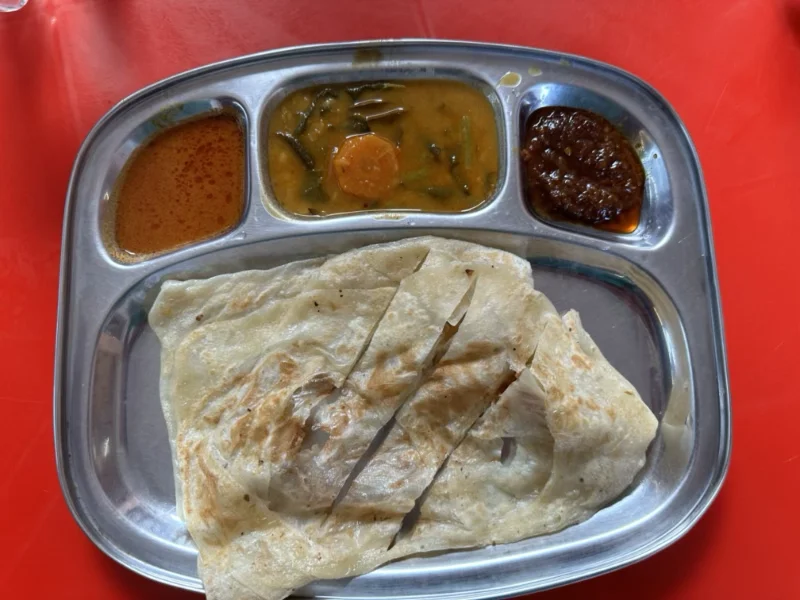
These days, the roti canai has come in variations of Roti Canai Sarang, Roti Canai Cheese, and so much more.
Nasi Kerabu
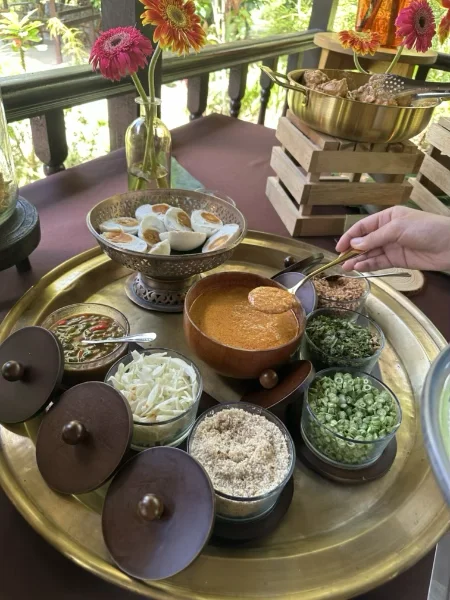
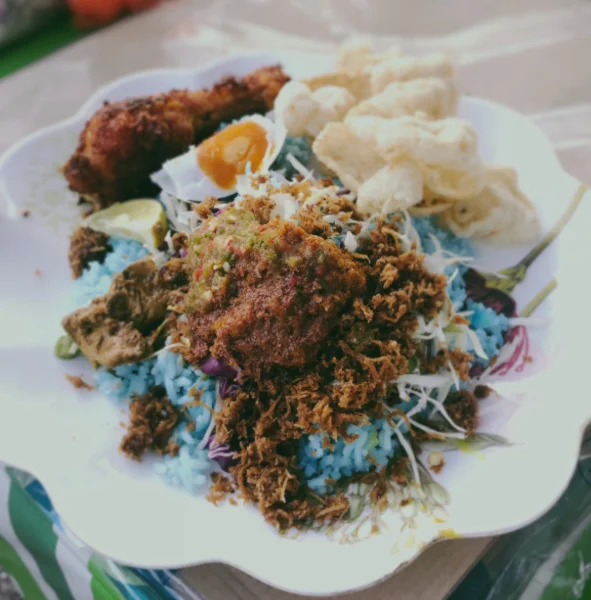
This blueish-purple-colored rice dish from Kelantan gets its color from the butterfly pea flowers mixed with cabbage, local salads, bean sprouts, prawn crackers, and fried chicken or fish. It tastes best when you eat with your hands!
Char Kway Teow
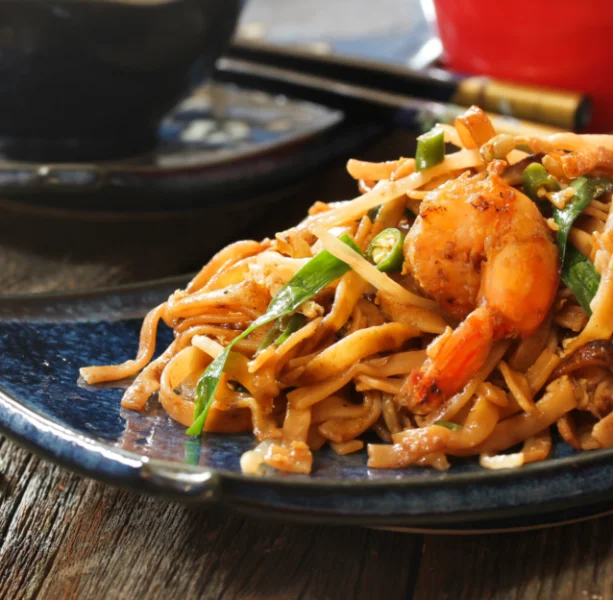
This is a stir-fried flat noodle cooked with prawns, rice cakes, sometimes cockles, soy sauce, and vegetables of choice – occasionally bok choy or cabbages. The way they cook it at night market is an unmissable sight!
Ramly burger
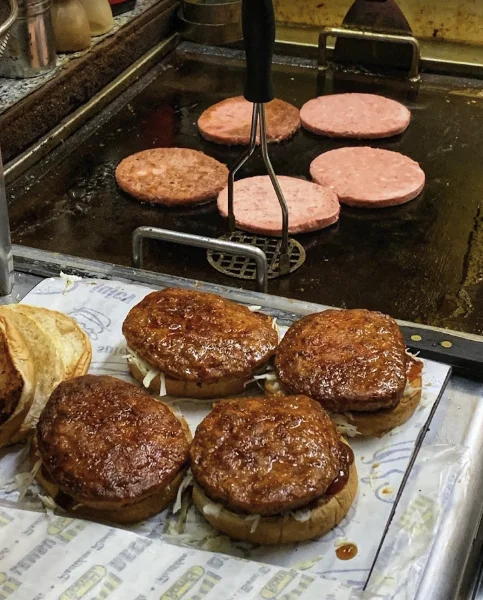
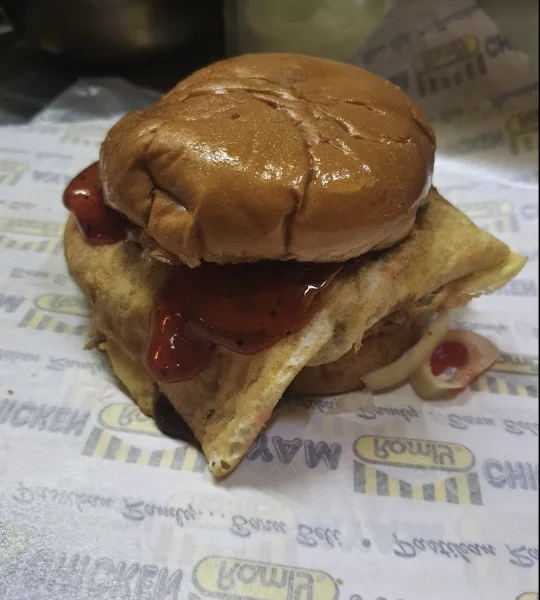
Step aside, McDonalds or Burger King! While many Muslim tourists come to Malaysia to try these Halal fast food chains, the one burger you can’t miss is the Ramly burger.
You’ll find it everywhere on the streets, especially from 5:00 pm onwards. What differentiates Ramly burger from the normal fast food burger is the juicy patties and overflowing sauce you’ll get in it. Nothing like it!
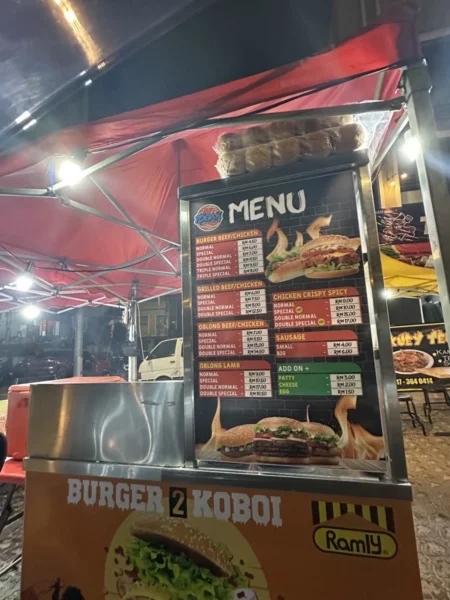
Kuih Muih
These are bite-sized, vibrant-colored desserts found at the sides of the road or in Muslim-friendly hotels and high-end eateries.
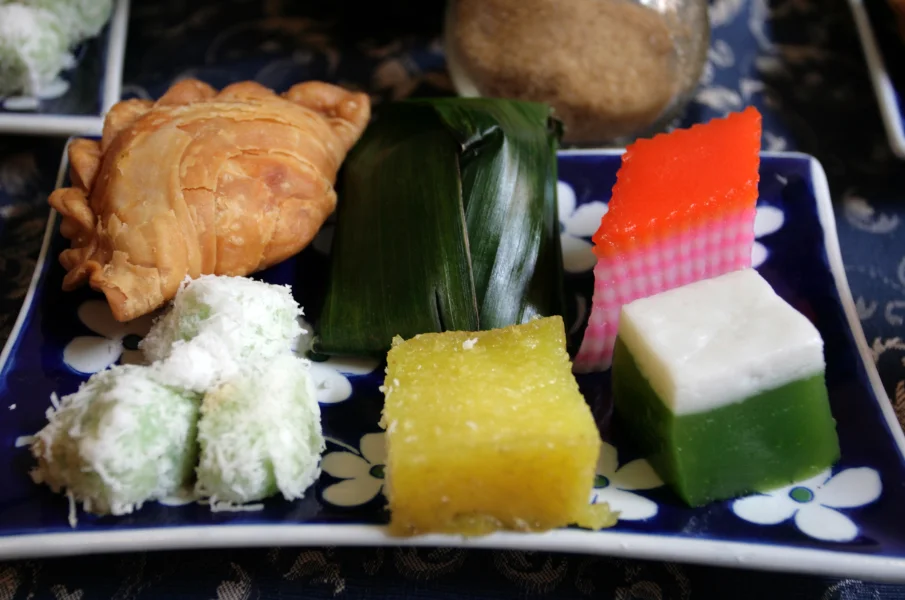
Some sweet and some savory, and while there is no particular kuih that takes the reign king in the assortment of it all, some kuih that you can’t miss out on are Kuih Lapis, Kuih Seri Muka, Kuih Kochi, Karipap (Currypuff), to name a few. These are great for breakfast and tea time
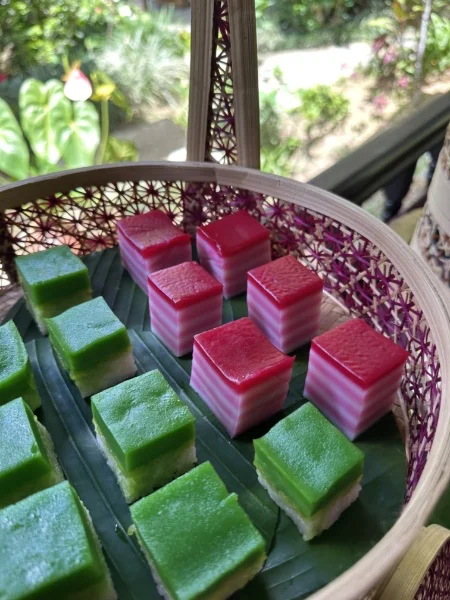
Special Mention: Teh Tarik
While there are many drinks in the country that one should try, you can not leave Malaysia without sipping its condensed pulled milk tea – the English translation of Teh Tarik. You can have it with Nasi Lemak, Roti Canai, etc!
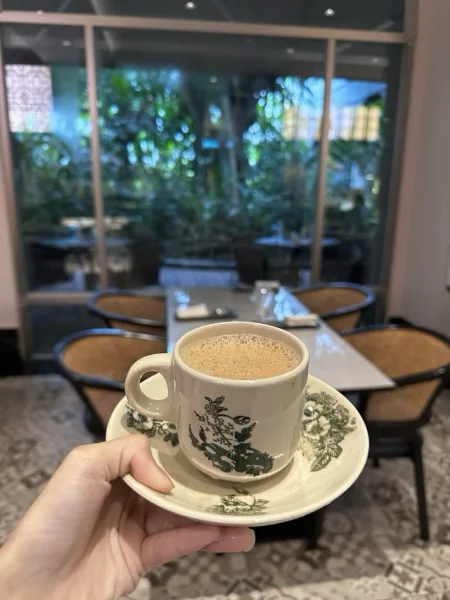
These are just some of Malaysia’s iconic dishes readily available in many restaurants throughout the country, you’ll find more dishes as you explore the country more.
Foodie Culture in Malaysia
Malaysia is huge in its foodie culture, evident in all corners of the country.
Some foodie culture has already been stated above, like the Ramly street burger. Still, what will further enrich your solo travels to #MuslimFriendlyMalaysia is when you understand that food is not only the country’s favorite past time but present time and is the getaway to a heart of a local – the Halal way, of course!
Heavy Breakfast and 3x meals a day
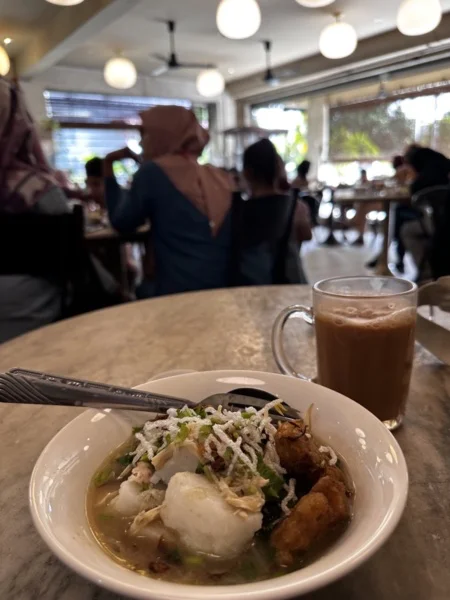
Malaysians love their breakfast, lunch, and dinner equally. If it’s not the colorful kuih and savory Nasi Lemak, it would be roti canai, Laksa, or even Nasi Kerabu in the morning.
And you wouldn’t be surprised to find that programs, conventions, and conferences throughout the country would be scheduled around these meals. There’s no such thing as going hungry in the country!
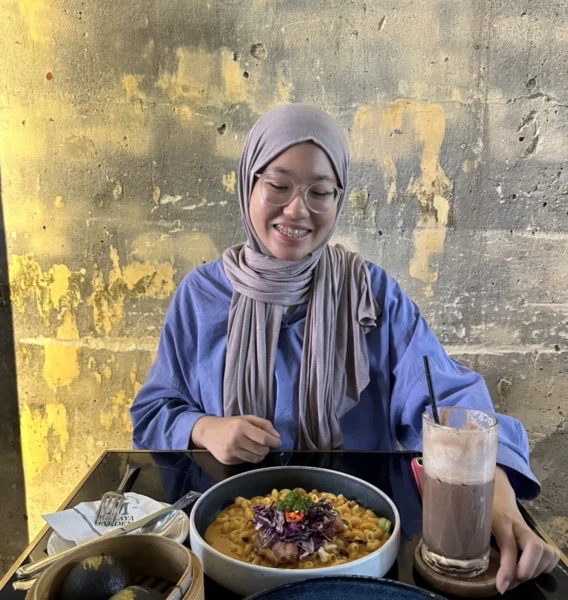
The only question you might have would be “What to eat?” as there are too many options!
Mamak Culture
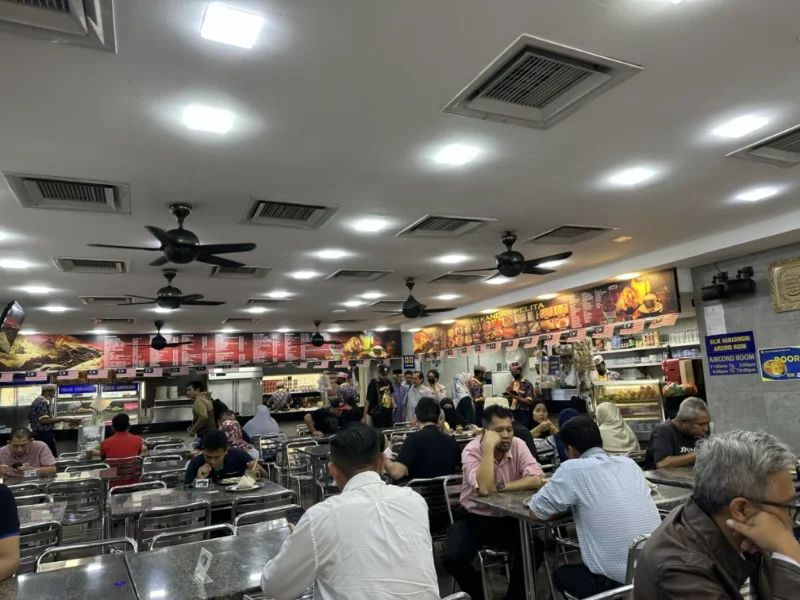
The term Mamak describes the Tamil Muslim people, who originated from South India. These are the same people that brought in roti canai, Nasi Kandar, and in turn, made it into an open-air establishment that contributes to the bustling ambiance of having meals 24/7!
The Mamak stalls and restaurants in Malaysia are guaranteed to see Halal Food, so you do not have to worry about that.
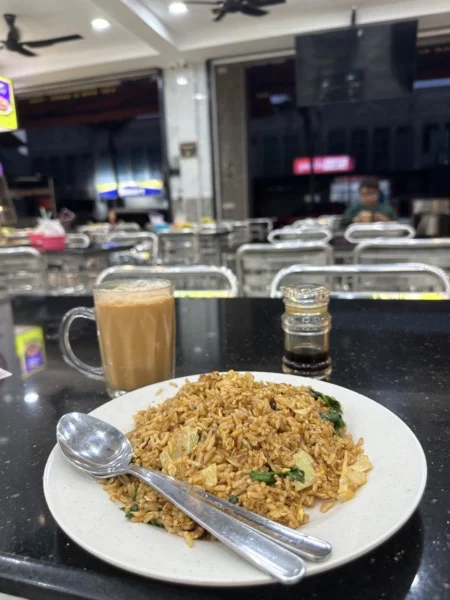
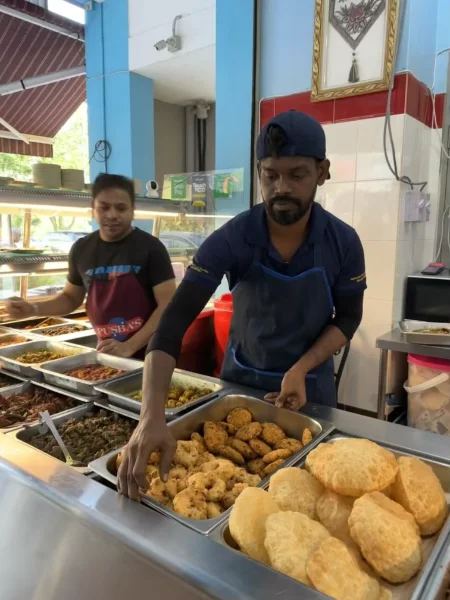
Besides the roti canai, Nasi Kandar meal, some great Mamak cuisines include Mee Mamak!
Some Mamak establishments in the country:
- Nasi Kandar Pelita (locations throughout Malaysia)
- Hameediyah (directions to KL; Damansara)
- Q Bistro (locations throughout Klang Valley)
Kopitiam Culture
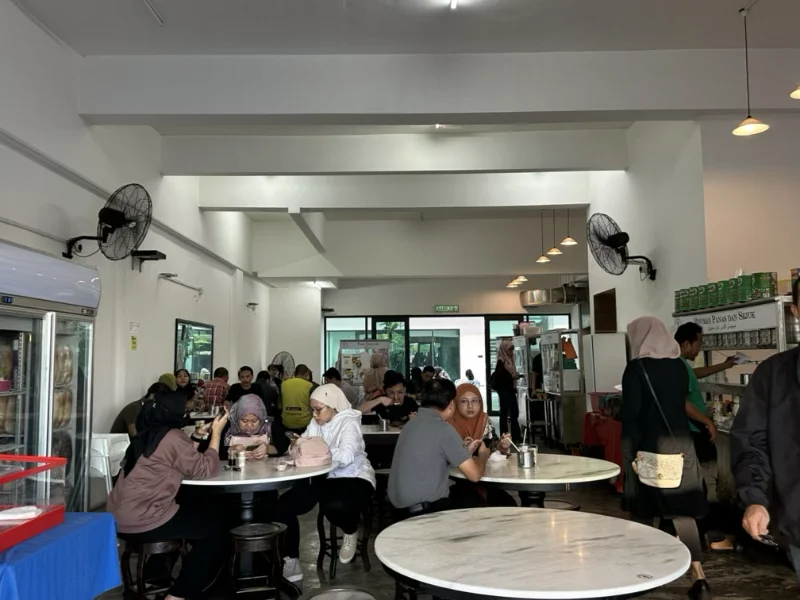
Originating from the Chinese immigrants, particularly the Hainanese people who had to find an alternative means of income since the other major Chinese dialect groups of Hokkien, Cantonese, and Teochew had already settled in trade, mining, and agriculture in the 1800s.
The word kopi tiam combines kopi (coffee), and tiam (shop) in Malay and Hokkien.
Today, the classic kopitiam still retains the marble table, with green floral ceramics as its identity, but the kopitiam is open to not only the Chinese, but to the whole of Malaysia’s population.
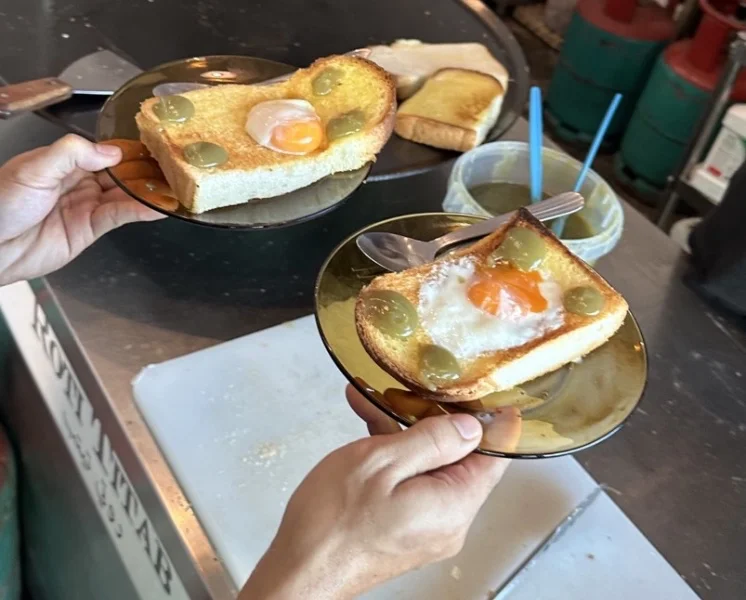
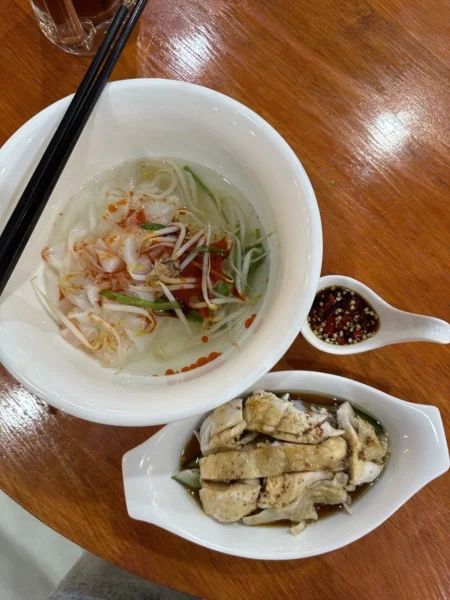
While there are full-fledged menu in a kopitiam, you’ll have the classic buttered toast, soft-boiled eggs, and of course, coffee in the green embroidered mug – a signature of the kopitiam menu.
Some kopitiam to check out (available throughout major cities):
- Ali, Muthu, and Ah Hock (Instagram page)
- Bungkus Kaw Kaw (Website)
- Old Town White Coffee (Website)
Street Food in Malaysia (Ft. Tip on Ramadhan)
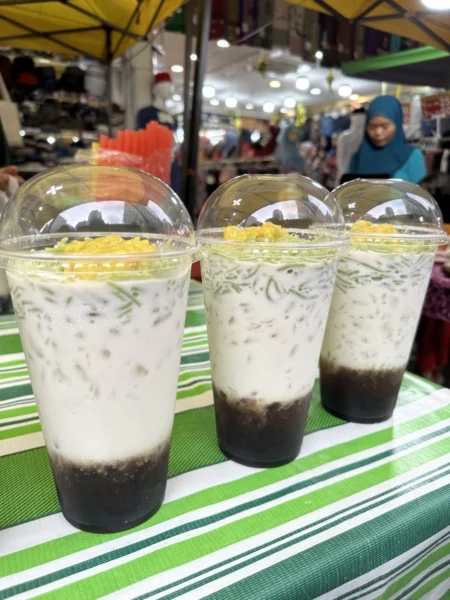
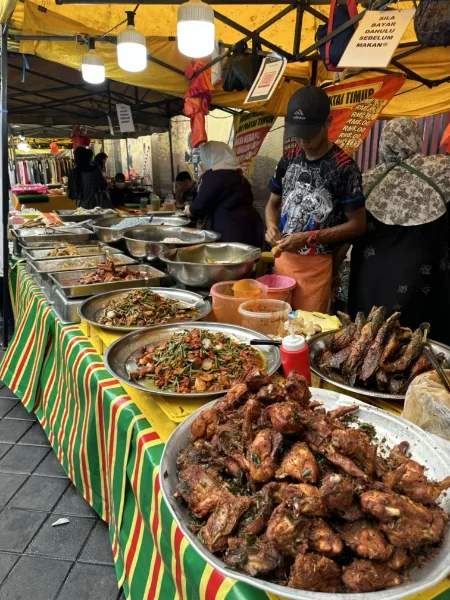
If you’d ask us, where to get the best halal food in KL, our answer would have to be street food!
The street food in Malaysia is a world on its own.
Whether it is a Weekend Night Market, a Morning Sunday Market, Ramadhan Bazaars, or just a random pop-up tent by the side of the road, these are all considered street food of the country.
These markets typically have everything, from open-air stalls and food courts that allow you to buy a pack of Keropok Lekor (fish cracker snack). Or pop-up tables that lets you eat a plate of Nasi Lemak by the street.
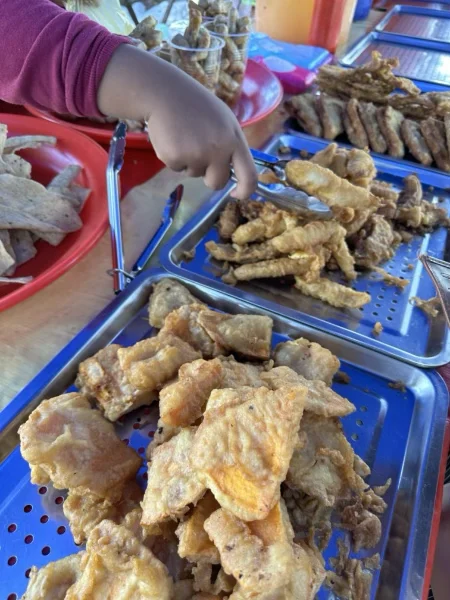
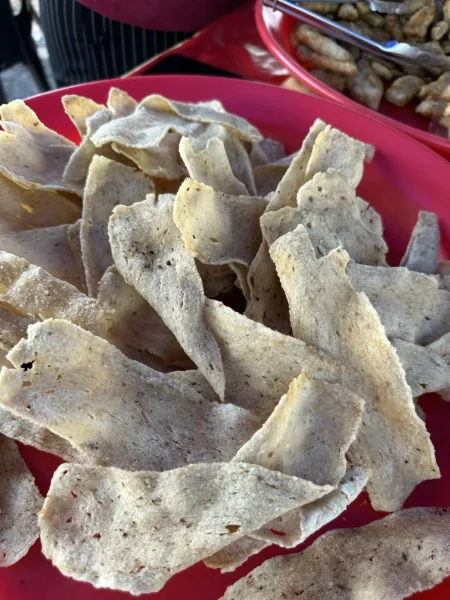
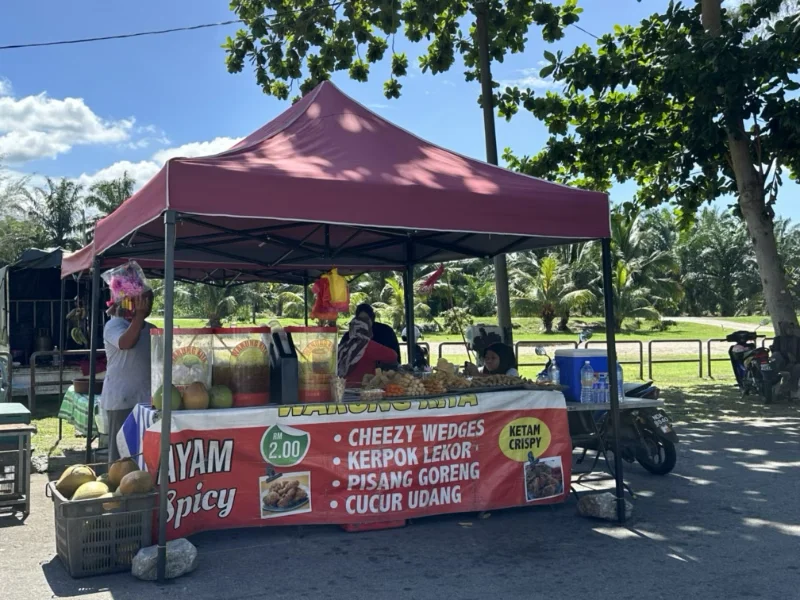
These days, the street food scene has become even more creative with food trucks offering all kinds of foodie offerings! One in particular is the Tapak Urban Street Dining.
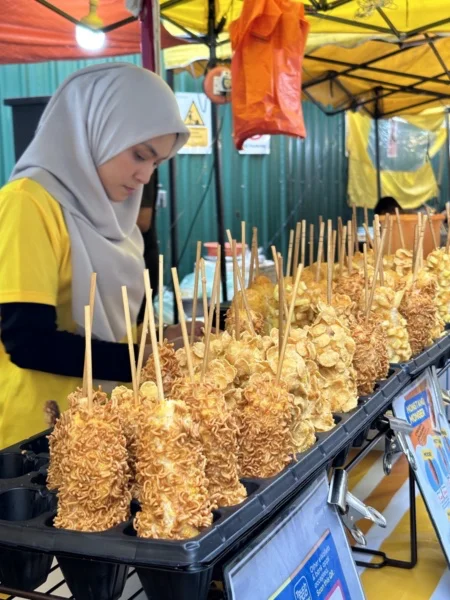
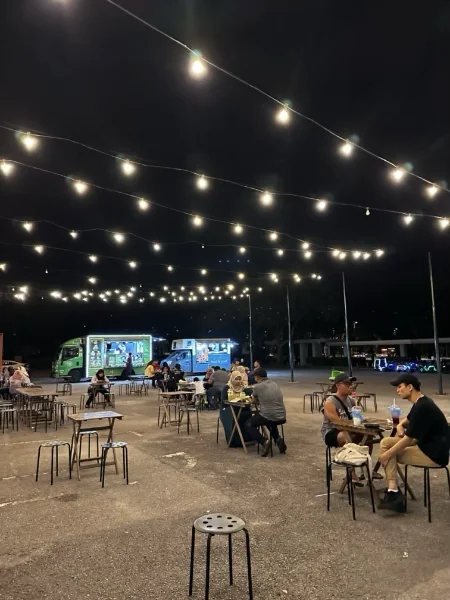
Night Street Food Markets around Klang Valley To Visit (open 5pm onwards):
- Pasar Malam Jalan TAR (Halal, famed for the country’s flagship Ramadhan Bazaar) directions
- Kampung Baru (All kinds of Halal restaurants within KL’s only village) directions
- Jalan Alor (watch out, as most of the street food here is non-Halal) directions
- Tapak Urban Street Dining (Ampang, Stadium KL, PJ, Shah Alam) respective directions
MST Tip: Food Courts For All-In-One, Affordable Meal!
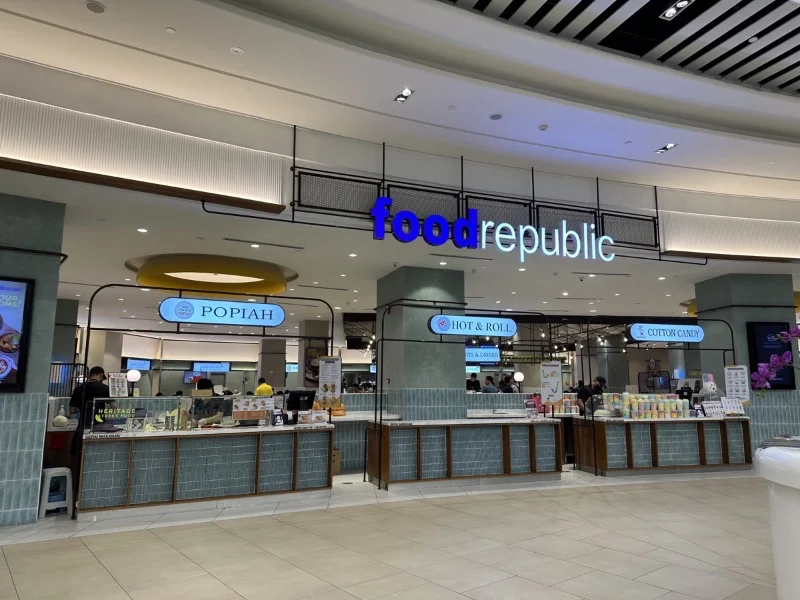
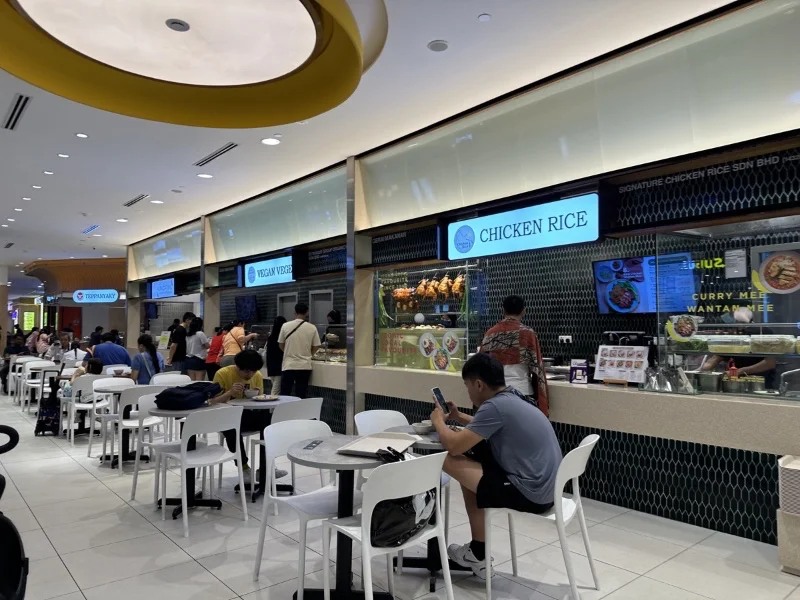
If you can’t make up your mind, all the malls in the country have their own indoor or alfresco food court.
Otherwise, look for the term “Medan Selera” (which means food court in Malay) if traveling anywhere in the country. These are usually food courts on their own (not attached to a mall) hosting a couple of hawker stalls.
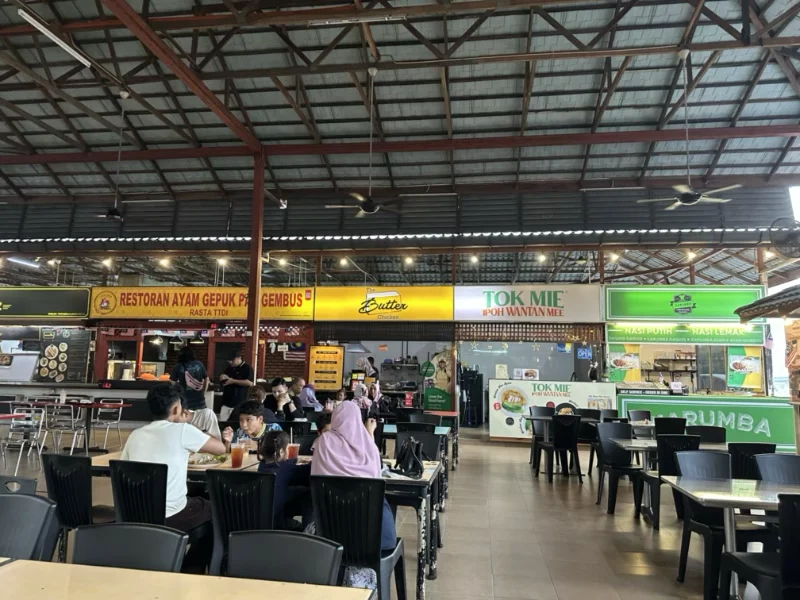
Within just a stroll, you’d be able to see all kinds of delicacies and cuisines sold. They’re also very cheap compared to ordering from an established restaurant or cafe.
Our favorite food courts in Kuala Lumpur?
- Food Court in Pavilion Mall, Bukit Bintang, for all kinds of cuisine, local and international (directions & opening hours here)
- Within Kuala Lumpur International Airport on Level 2 (directions). Fantastic food court options that give you a great meal for a couple of hours in KL!
- Medan Selera Jalan Muda Abdul Aziz, famous open-air style food court in KL with great local fare from breakfast to dinner. (directions & opening hours here)
Beware of the Spice!
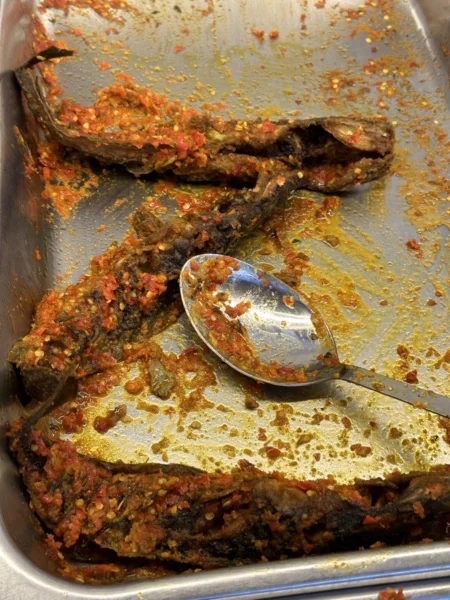
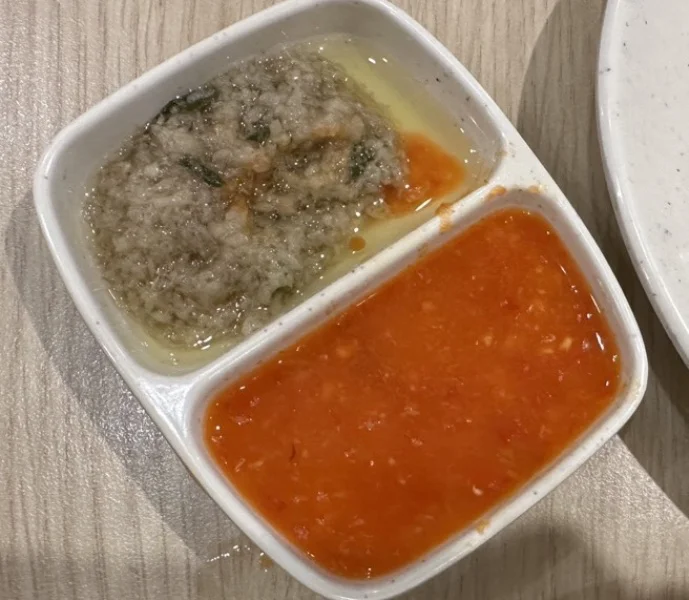
In Malaysia, a lot of the dishes have a strong kick and it’s common to get a burning sensation in your tongue. Particularly when you eat in the northern states of Peninsular Malaysia like Penang, Perlis and Kedah. These also apply to capital city of Kuala Lumpur as it’s a diverse city with restaurants coming from throughout the country.
If you have low spice tolerance, just be sure to not overdo it when trying out the sambal (dark red chilli paste). If any of your meal has sambal or chilli-based paste as a condiment, ask the restauranteurs to separate it and not mix it into the main meal, which is usually rice or noodles.
Dining Alone in Malaysia as a Muslimah
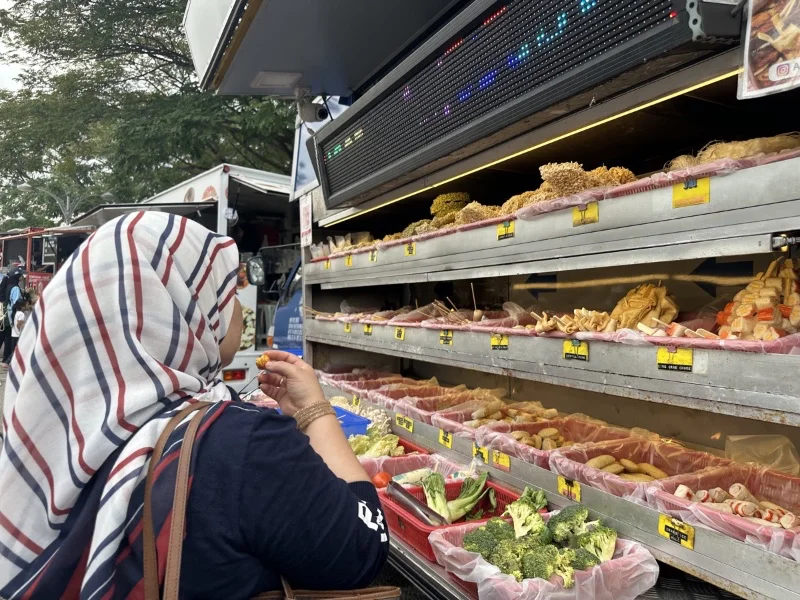
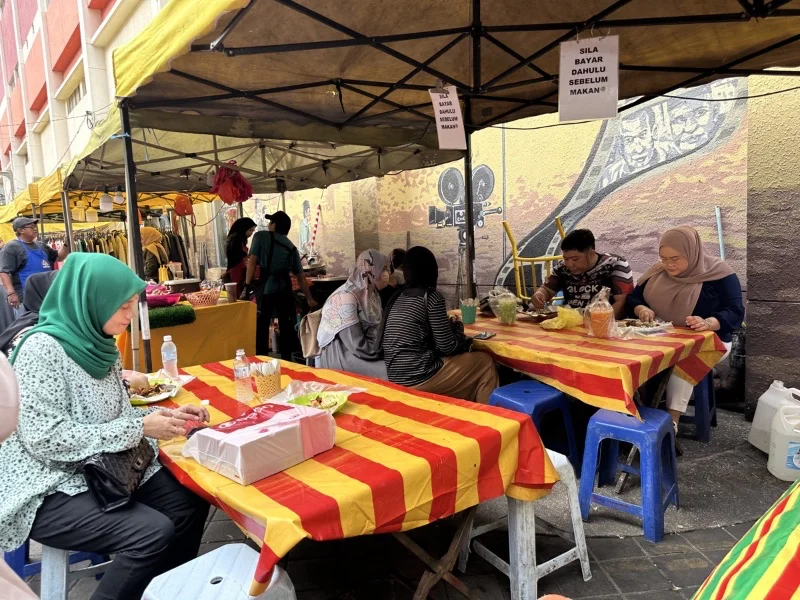
It’s also super duper easy and friendly for the Muslimah to dine alone in Mamak stalls, Kopitiam, Convenient Stores, Food Courts, or pop-up tables at any Street Food Stalls.
Not only are these establishments usually Halal, but they also have a more “open”, “free and easy” vibe for anybody to come and eat for as quick or as long as they want. Contrary to the more upscale restaurants, which can feel intimidating for those going solo for a meal!
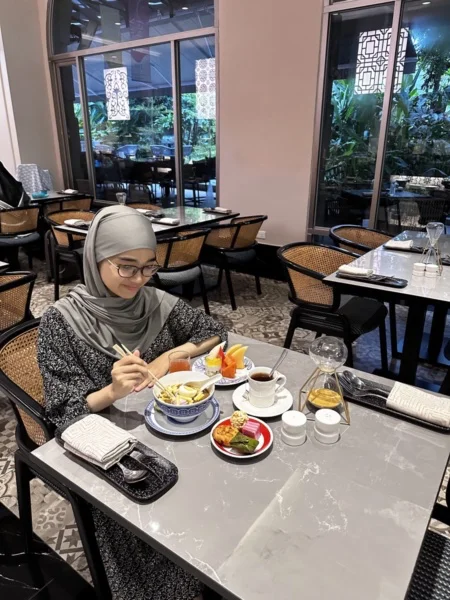
We know dining alone can be daunting for Muslimah Solo Travelers, especially on their first-ever solo trip. But this would not be an issue in most of the country’s local food scene.
When in Malaysia – Must-try Tropical fruits
When in Malaysia, not only do the local dishes make your tummy full, but the tropical fruits are also an adventure on their own!
Specifically… the spiky and smelly durian! The musang king can go up to 40 ringgit or more in the season due to the demand!
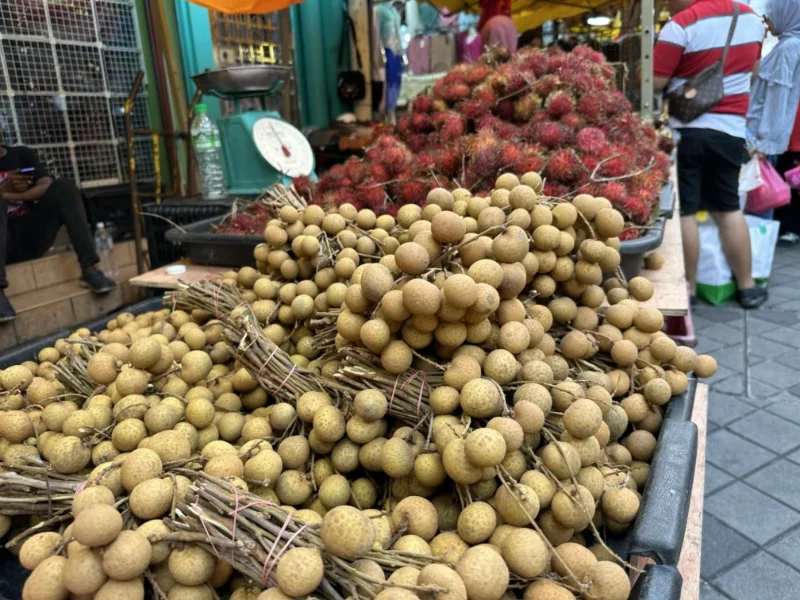
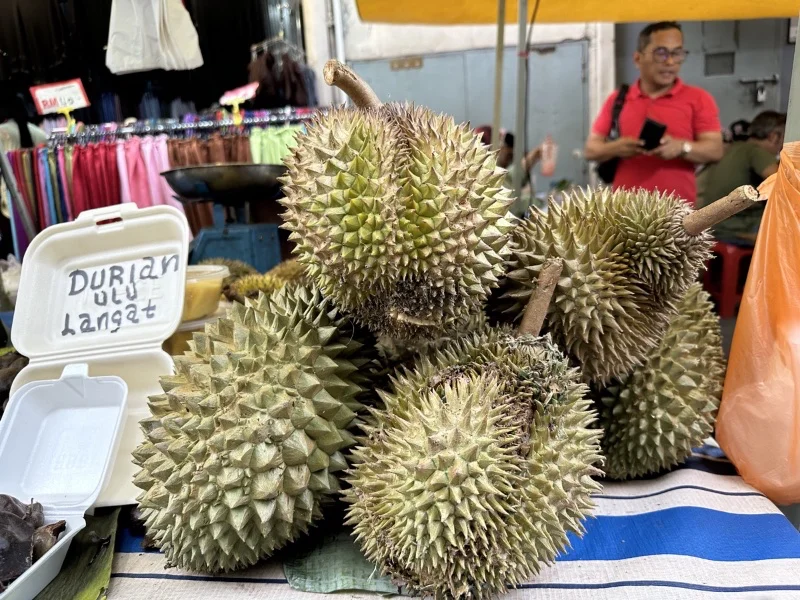
Some other tropical fruits you should try when in the country are Mangosteen, Rambutan (they look like lychee, but they’re not!), Jackfruit, Langsat, Longan, and more!
You can find them in the malls typically in central and local supermarkets. But nothing beats buying them at Sunday Markets when these tropical fruits are still fresh from the farm.
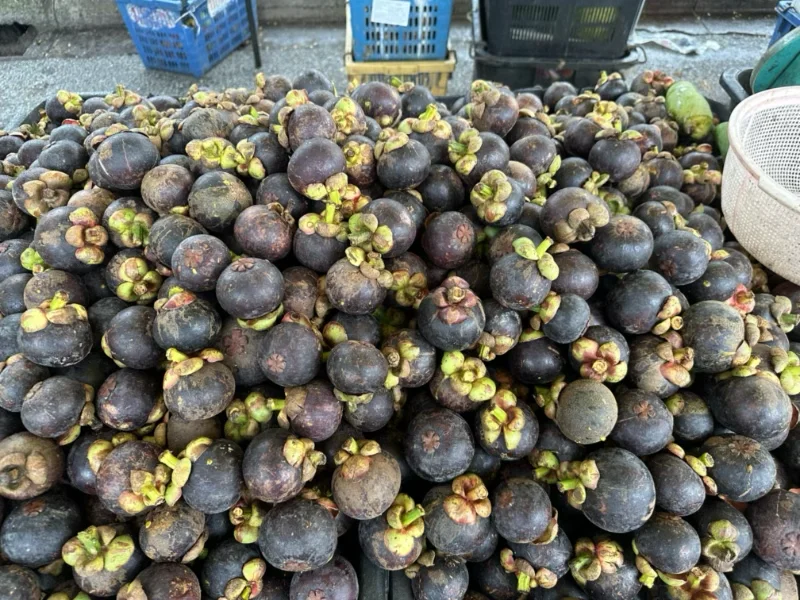
MST Tip: All hotels do not allow you to bring durian, mangosteen and jackfruits inside, because durian’s smell can be unpleasant and mangosteen is easily prone to staining the white hotel sheets. So eating these fruits outside at pop-up stalls is best. You’ll quickly find them in Sunday Markets of the countries, or at Jalan TAR Night Market or Jalan Alor Night Market in Kuala Lumpur.
Halal Convenient Stores & Deliveries – Perfect for Muslimah Solo Travelers on the go!
Today, the country has seen convenient stores and delivery services popping up like crazy throughout the country.
Convenience stores range from local brands to Japanese or Korean. These Halal convenience stores also provide sections where you can comfortably dine alone without feeling awkward.
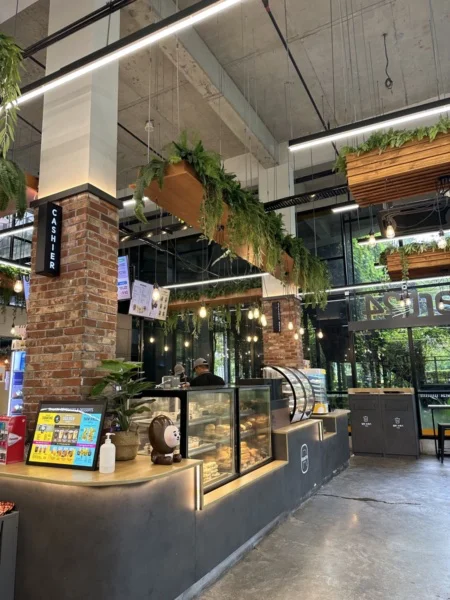
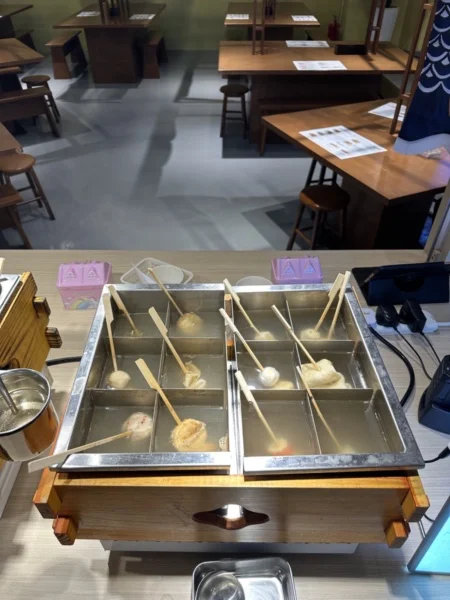
Delivery-wise, when you sign up for Grab for E-hailing services that lets you commute solo easily within the country, you’re also eligible for Halal Food Delivery.
So let’s say you’re tired after a whole day of exploring, or you haven’t adjusted to the time zone, you can order Halal food from the app and have it delivered to you so you can safely eat within your place of stay, anytime – even at 3 am!
International Halal Gastronomy
When it comes to the Halal Food scene in Malaysia, it is not just limited to the local options but also the international gastronomy.
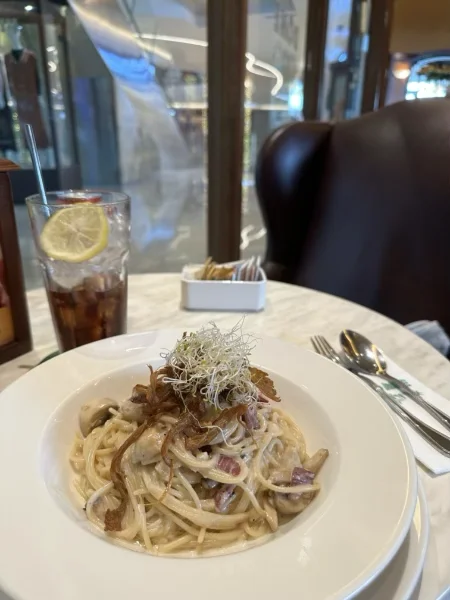
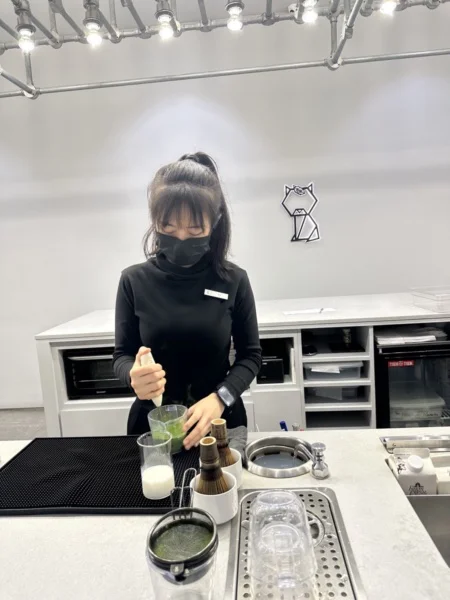
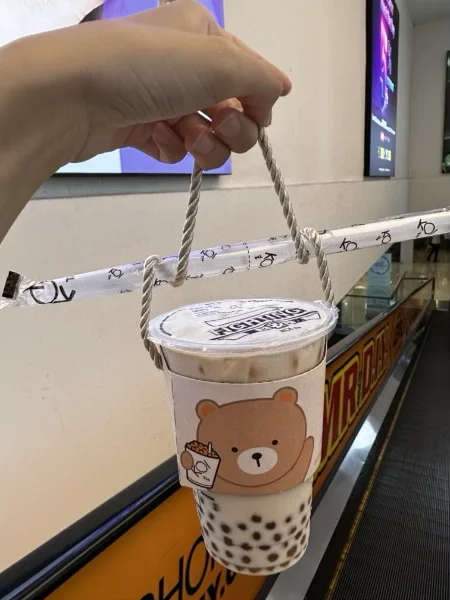
In Kuala Lumpur alone, you’ll find so much halal international food fare from Authentic Mediterranean cuisine to Halal Japanese dining experiences in Lot 10’s Level 4 (directions), Authentic Swiss Cuisine in TTDI (directions), Halal Korean BBQ in significant malls, Taiwanese Tea experiences in Starhill Gallery, and all kinds of Fusion or Pastry cafes in Pasar Seni – some you wouldn’t even think of exist!
Just walking around Bukit Bintang itself, at different times of the year, or at other food festivals, you’ll experience a variety of Halal food exploration.
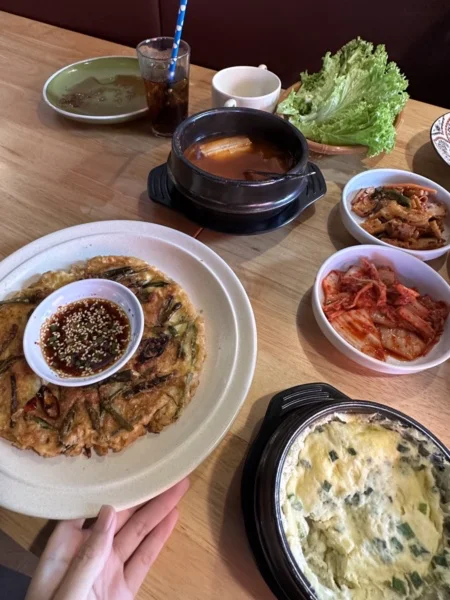
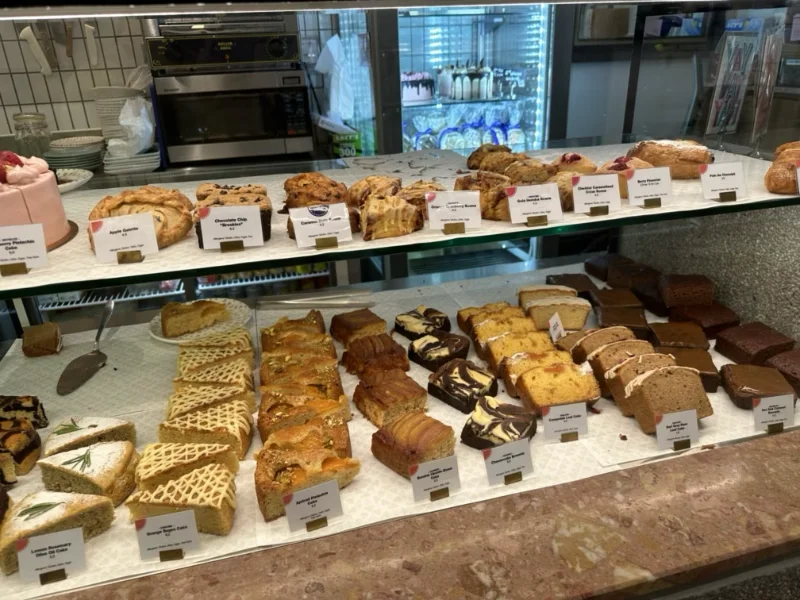
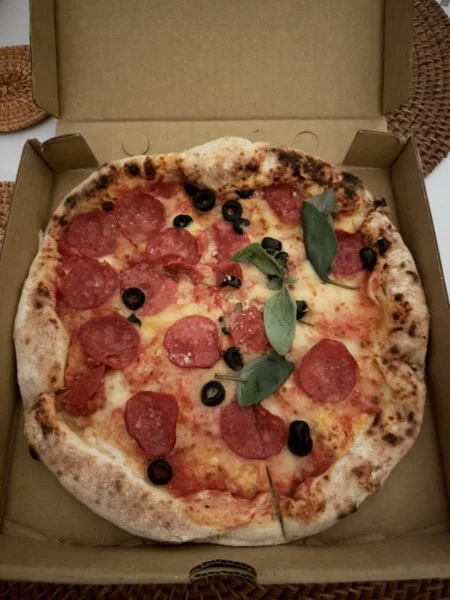
Wrap Up: Halal Food Malaysia (Must Try Iconic Dishes, Non-Halal Words To Know, and More!)
There you go! Ideas on looking for Halal Food in Malaysia, the Must-try Iconic Dishes and Desserts, and some Non-Halal Words to watch out for so you can travel solo peacefully and easily!
If you have ever dined in the country and found terrific experiences while traveling alone, share with us at @itc_my on Instagram or within the Muslimah Solo Travelers Community!
For more ideas on what to do and where to go in Malaysia, check out this entire Muslim-friendly Malaysia guide for first-timers or Seasoned Muslimah Solo Travelers, and Muslim-friendly Hotels in Malaysia on where best to stay for your burkini getaway!
